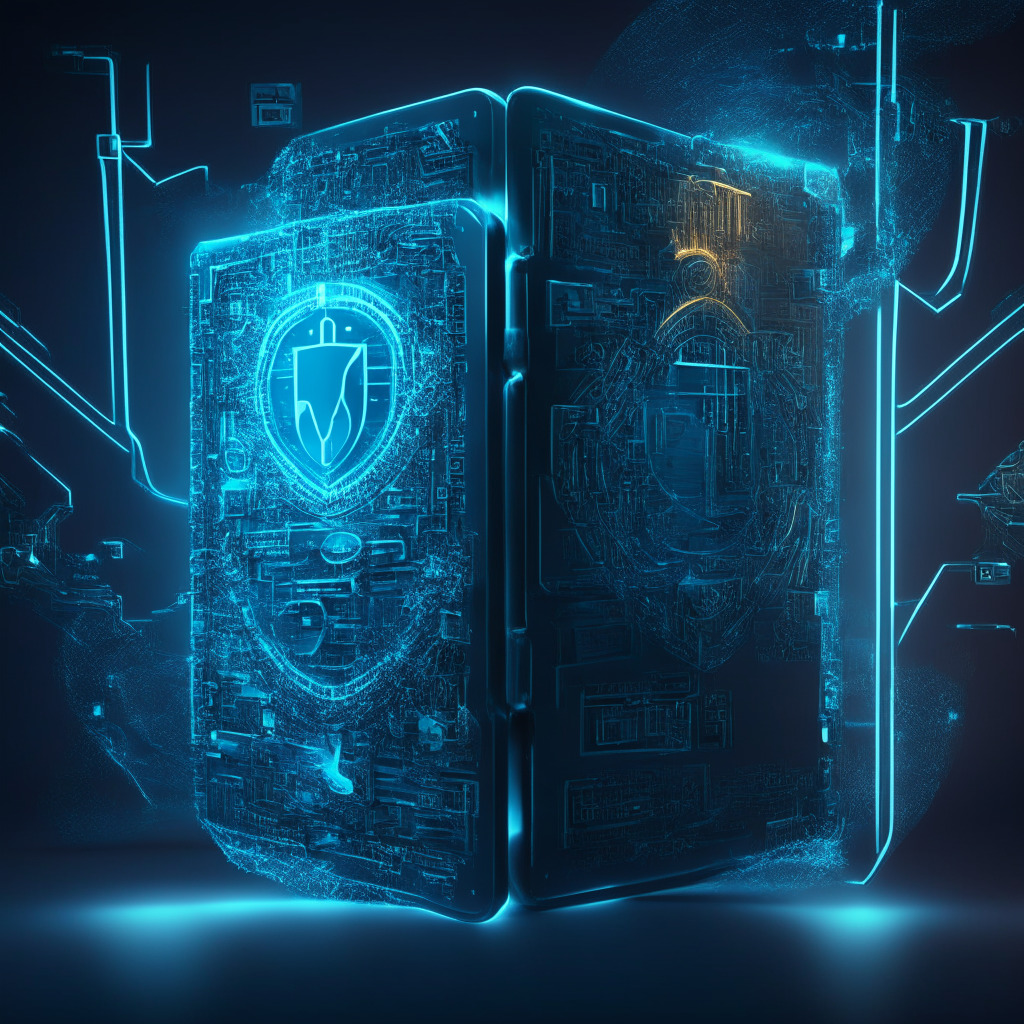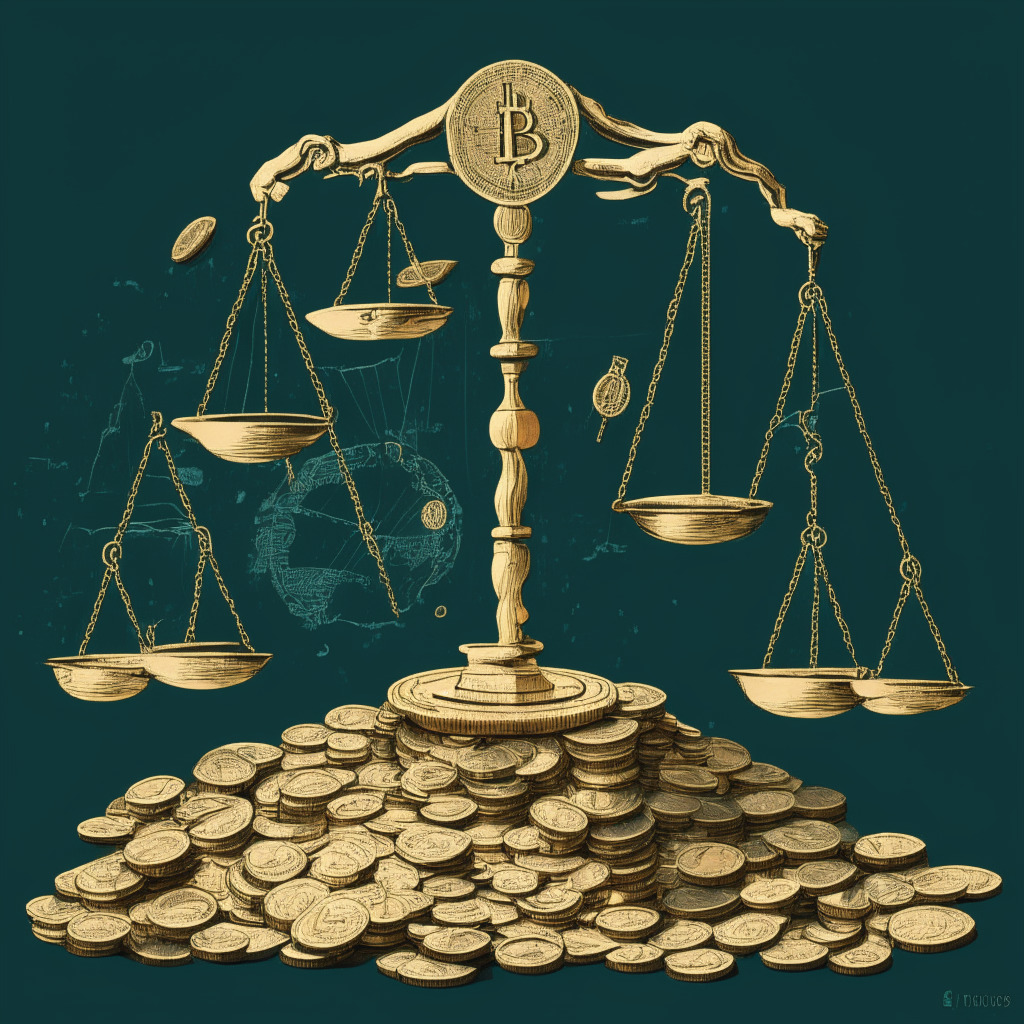“The Tel Aviv Stock Exchange (TASE) partners with digital asset platform Fireblocks for regulated cryptocurrency services, aiming for safer institutional crypto transactions. However, this invites concerns over stifling innovation and increased risks of cyber-attacks, data breaches, and crypto theft.”
Search Results for: Art Blocks
Expanding Cryptocurrency Custody: Fireblocks Partners with Cloud Giants, Security Concerns Linger
Cryptocurrency custody technology provider Fireblocks has expanded its support to cloud service providers including Amazon Web Services, Google Cloud Platform, Alibaba Cloud, Thales, and Securosus, aiming to cater to banks using on-premise and cloud-based IT infrastructures.
Crypto Integration Hopes at WWDC: Apple’s Potential RNDR Partnership & Roadblocks Ahead
The recent Apple Worldwide Developers Conference sparked speculations of a potential partnership between Apple and OTOY Inc., the company behind RNDR token and Octane X GPU rendering software. However, challenges like the lack of concrete announcements during the event and potential regulatory hurdles raise questions about the viability of implementing crypto payment solutions in consumer tech products.
UK Watchdog Blocks Crypto Ads: A Blow for Binance’s Marketing Plans or a Step Towards Regulatory Compliance?
“The Financial Conduct Authority (FCA) has put restrictions on Rebuildingsociety, a peer-to-peer lending platform partnered with Binance, inhibiting it from issuing crypto ads due to non-compliance with new marketing regulations. This change creates uncertainties and affects the platform’s ability to facilitate Binance’s visibility in the UK market.”
Fireblocks and Tezos Integration: A New Era of Security and Scalability in Cryptocurrency
Fireblocks, a provider of cryptographic custody and settlement solutions, has integrated full support for the Tezos network. This partnership enhances security for Tezos-based asset storage and streamlines access to decentralized applications. The collaboration also anticipates a surge in the protocol’s Decentralized Finance activities, contributing to its rising position among all protocols by total value locked.
Crypto Aid: Binance’s Pioneering Approach for Disaster Relief, and the Roadblocks Ahead
“Binance, a cryptocurrency company, donates $3 million in BNB to earthquake victims in Morocco, demonstrating blockchain’s potential for swift and direct humanitarian aid. However, this highlights knowledge disparities as local users must be familiar with handling digital assets responsibly.”
Fireblocks’ Non-Custodial Wallets: Shaping the Future of Digital Asset Control and Security
Cryptocurrency custody firm Fireblocks, in response to market leaders’ high-profile collapses, introduces a non-custodial wallet service, giving users control over their cryptographic keys. Adopting a fully non-custodial setup empowers users, bypasses regulatory restrictions and potentially revolutionizes fintech and blockchain technology’s future.
Navigating Cryptocurrency Roadblocks: Singapore’s Regulatory Approach and the FinTech Sandbox Dilemma
“The Monetary Authority of Singapore (MAS) announced no businesses qualified as cryptocurrency payment providers under the FinTech Regulatory Sandbox. MAS is cautious about adopting payment innovations and emphasizes a need for crypto businesses to demonstrate robust Anti-Money Laundering controls.”
Navigating FinTech’s Double-Edged Sword: Nexo’s Dual Mode Crypto Card’s Triumphs and Roadblocks
Nexo, in partnership with Mastercard, recently launched the first “Dual Mode Crypto Card”, providing crypto-based debit and credit services in the European Economic Area (EEA). It promises added user benefits but also faces regulatory challenges, exposing the delicate balance of crypto innovation and legal compliance.
Solana’s Bullish Run: Potential for 10x or Regulatory Roadblocks?
The Solana (SOL) cryptocurrency is showing strong momentum, driven partly by the integration of Solana Pay with Shopify Inc. However, its future course is uncertain, contingent on broader market trends and potential US regulatory changes. Despite this, Solana’s potential for significant upside expansion as a decentralized application platform remains promising.
Blockstream’s Big Bet: Investing $50M in Undervalued ASIC Mining Gear Amid Bitcoin Recovery
“Blockchain firm Blockstream plans to raise $50 million for the bulk purchase of undervalued ASIC mining equipment. Partnering with STOKR, they aim to launch the Blockstream ASIC Note, with most investments expected in Bitcoin. This strategy indicates a promising future despite the declining price of ASIC miners and Bitcoin’s recent price recovery around $30,000.”
Dubai’s Tech Utopia: The Lure of Subsidized Licenses and Potential Roadblocks
“Dubai is heavily incentivizing AI and Web3 companies by offering a 90% subsidy on commercial licenses. This is part of a larger initiative to create a significant tech hub in the MENA region, with resources like AI facilities, training programs, and internal support. Dubai’s tech-friendly initiatives, including operational licenses to crypto exchanges, aim to stimulate innovation, attract global talent and investment, and build a prosperous technological ecosystem.”
Navigating the Roadblocks for Mainstream Cryptocurrency Adoption: An In-depth Analysis
“Cryptocurrency’s trajectory to mainstream adoption is hindered by significant challenges such as education gaps, regulatory issues, blockchain interoperability, infrastructure needs, and security concerns. Notwithstanding these, ongoing collaboration between developers, businesses, institutions, and governments fosters cautious optimism about crypto’s mainstream integration.”
Unmasking BitForge: The Hidden Vulnerabilities of Multi-Party Computation Technology in Crypto Wallets
Fireblocks, a crypto infrastructure company, exposed vulnerabilities, known as “BitForge”, in crypto wallets that use multi-party computation (MPC) technology. High-profile firms including Coinbase, ZenGo, and Binance quickly partnered with Fireblocks to counter these vulnerabilities, thus safeguarding against potential exploitation. The vulnerabilities highlighted safety issues about the previously assumed secure MPC wallets.
MakerDAO Blocks VPNs: Privacy Vs Profit in the Decentralized Finance World
MakerDAO’s Spark Protocol blocking access to its lending platform for VPN users has caused uproar among privacy enthusiasts. This move, aimed to prevent U.S. users from interacting with the Spark Protocol, has been criticized for potentially compromising personal privacy.
AI Investment Boom: The Potential Impact on U.S. GDP & the Roadblocks Ahead
“Goldman Sachs reports that ‘generative AI’ could fuel global labor productivity by over 1% a year post widespread adoption. Initial AI investments could reach around $200 billion globally by 2025, potentially accounting for 2.5% – 4% of U.S. GDP.”
Blockchain’s Daring Venture into Art: Sotheby’s Gen Art Program’s Promising Revolution and Potential Risks
Sotheby’s recent launch of the blockchain Gen Art program showcases how blockchain technology could revolutionize art trading. However, it also opens uncertainties, with questions about whether such a transition might compromise traditional art values in the digital rush. Despite skepticism, the transition promises a potential merging of art and tech, offering new opportunities for artists, collectors, and technologists.
National Australia Bank Blocks Certain Exchanges: A Necessary Safeguard or Hindrance to Crypto Progress
The National Australia Bank (NAB) announced blocks on certain “high-risk” crypto exchanges to prevent scams and protect customers. Critics argue this could limit the crypto industry’s growth. NAB claims about 50% of scam funds reported in Australia are linked to cryptocurrency, emphasizing the need for a balance between efficiency and security in financial transactions.
Tether’s Strategic Partnership with Georgian Government: A Boon for Blockchain Startups or a Bane for Power Resources?
Tether, the company behind USDT coin, is partnering with the Georgian government to establish a fund for supporting local blockchain startups. The alliance aims to boost Georgia’s tech sector and increase the adoption of peer-to-peer payment systems. Despite initial challenges, Georgia continues to aim for crypto adoption, with Tether committed to fostering a thriving startup ecosystem.
Hut 8’s $50M Coinbase Loan: Growth Opportunities & Potential Legal Roadblocks
Hut 8 Mining secures a $50 million loan from Coinbase Credit to fund operations and its merger with US Bitcoin Corp, highlighting increasing institutional interest in cryptocurrency investments and potential growth within the crypto mining industry. However, recent legal challenges faced by Coinbase warrant caution.
CryptoPunks Official Book: Chronicling Decentralized Art & Balancing Market Volatility
CryptoPunks, the iconic NFT project that jumpstarted the NFT art movement, is releasing an official book this winter detailing its impact on decentralized digital art collecting. Partnering with Yuga Labs and Zak Group, the book explores the 10,000 Ethereum avatars’ artwork and their significance on the industry.
Generative AI: Democratizing Creativity or Displacing Artists? Pros, Cons & Copyright Dilemma
Generative AI, like ChatGPT, democratizes the creative process, aligning with Web3 decentralization ideals. Tools such as DALL-E and StarryAI enable users without artistic background to create AI-generated NFTs. However, concerns about job displacement, copyright issues, and ownership of AI-generated works persist, leaving the legal status uncertain.
Blockstream’s ASIC Miner Launch in 2024: Weighing Pros, Cons, and Market Impact
Blockstream plans to release their long-awaited ASIC miner in Q3 2024, after acquiring mining hardware manufacturer Spondoolies in 2021. The delay allows for thorough testing but may cause disappointment among followers, affecting the community’s perception of the overall blockchain and cryptocurrency market.
Deutsche Telekom Embraces Blockchain by Supporting Polygon: Analyzing the Partnership
Deutsche Telekom enters blockchain sector by supporting Polygon infrastructure as a validator, aiming to boost security and decentralization. The partnership is expected to unlock ownership and autonomy, making Web3 technology more accessible and encouraging businesses to embrace blockchain via Polygon.
Essential Security Measures for Web3 Startups: Tips from Israel Crypto Conference Expert
At the Israel Crypto Conference, Shahar Madar of Fireblocks emphasized the importance of security in Web3 startups and shared insights to protect platforms and users, including establishing a security framework, access control, and developing a game plan against potential threats.
Debt Ceiling Agreement Blocks Crypto Mining Tax: A Win for the Industry or Environmental Setback?
The recent U.S. debt ceiling agreement has notably blocked the proposed Digital Asset Mining Energy (DAME) excise tax, preventing a 30% tax imposition on cryptocurrency mining firms. This outcome, seen as a victory for the crypto industry, has sparked debates around the environmental impact of crypto mining operations and the importance of addressing energy consumption concerns for a sustainable future.
Debt Ceiling Deal Blocks Crypto Mining Tax: Boon or Bane for the Industry and Environment?
President Joe Biden and House Representative Kevin McCarthy reached a tentative debt ceiling deal that, if passed, would block the proposed 30% tax on crypto miner’s electricity bills. Critics argue the blocked tax denies encouragement for sustainable energy practices in the crypto mining industry, while proponents view it as a victory for maintaining competitiveness.
Namada and Osmosis Partnership: Exploring Privacy Advancements and Community Reactions
Namada, a privacy-focused blockchain firm, is considering partnering with Cosmos-based Osmosis protocol to implement shielded actions for enhanced privacy and security in cross-ecosystem asset management. However, reservations exist, with the collaboration’s future hinging on the Osmosis community’s response, and concerns about compatibility between the two systems.
Bitcoin Smart Contracts: Revolutionizing Crypto or Crippling the Network?
Cryptocurrency developer Punk3700 launched the claimed first Bitcoin-based smart contract, reigniting the debate between Bitcoin maximalists and those open to diverse blockchain technologies. Projects like metaverses and an Ethereum Virtual Machine for Bitcoin raise concerns about network congestion and higher transaction fees, potentially discouraging users in developing countries.
Blurring the Lines: Checks Elements Combines NFTs and Hand-Drawn Art – A Harmonious Future?
Jack Butcher launches Checks Elements, combining generative art with hand-drawn physical prints in a 152-piece collection inspired by earth, fire, water, and air. Bridging digital and physical art, the collection connects Ethereum-based NFTs with Butcher’s authenticated monoprints.
Stronghold Digital’s Partnership with Canaan: Mining Power Boost or Centralization Concern?
Stronghold Digital partners with Cantaloupe Digital, a Canaan subsidiary, to activate 4,000 Avalon miners and increase hashrate capacity. Critics argue this may lead to further centralization and environmental concerns, while proponents see potential for driving industry innovation and cost reductions.
Halt the Polygon Party: 0VIX Exploit Exposes Struggles in POS and zkEVM Territory
Polygon lending protocol 0VIX has announced a temporary halt to its POS and zkEVM operations […]































